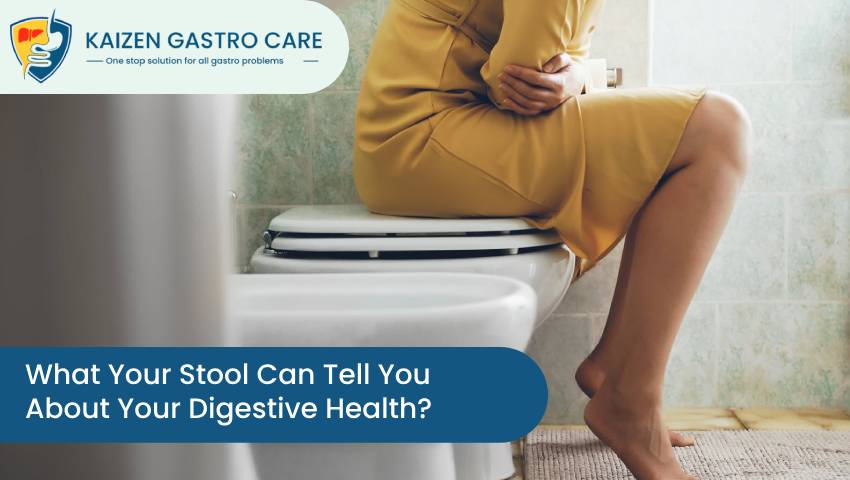
- 27/11/2024
- Kaizen Gastro Care
- 0 Comments
- Proctology
What Your Stool Can Tell You About Your Digestive Health?
Our stool is an important indicator of digestive health, yet it’s often ignored. Paying attention to its appearance, consistency, and frequency can provide valuable insights into your gastrointestinal system. At Kaizen Gastro Care Clinic, Dr. Vikrant Kale and Dr. Samrat Jankar, leading gastroenterologists in Pune, emphasize the importance of understanding what your stool can reveal about your overall health.
Why Is Stool Analysis Important?
The stool reflects your diet, hydration, gut health, and even potential conditions. Changes in color, consistency, or frequency can indicate underlying digestive problems that may require medical attention. Regular monitoring can help detect issues early and ensure timely treatment.
What Does Your Stool Say About Your Digestive Health?
Color Changes:
- Brown (Normal): Shows healthy digestion with proper bile production.
- Black or Tarry: This may show bleeding in the upper digestive tract or iron supplements.
- Red: This can be a symptom of lower gastrointestinal bleeding, such as hemorrhoids, fissures, or polyps.
- Yellow or Greasy: Often indicates malabsorption or pancreatic problems.
- Pale or Clay-Colored: Could signal bile duct obstruction or liver issues.
Consistency and Shape:
- Well-formed and Soft (Ideal): Signal of a healthy diet with adequate fiber and hydration.
- Hard or Pellet-like: Associated with constipation or insufficient fiber.
- Loose or Watery: May result from infections, food intolerances, or irritable bowel syndrome (IBS).
- Ribbon-like or Thin: This could indicate intestinal obstruction or a more serious condition, like colorectal cancer.
Frequency:
- 1-3 Times a Day (Healthy): Regular bowel motions show your digestive system is functioning optimally.
- Less Frequent: May signify constipation, dehydration, or dietary imbalances.
- More Frequent: Could be a symptom of infections, stress, or chronic conditions like Crohn’s disease.
Presence of Blood:
Blood in your stool should never be ignored:
- Bright Red Blood: Suggests bleeding from hemorrhoids, anal fissures, or the lower GI tract.
- Dark Blood: Indicates possible bleeding from the stomach or small intestine, such as from a peptic ulcer.
Unusual Odors:
While stool naturally has an odor, an excessively bad smell might signal malabsorption conditions like lactose intolerance, celiac disease, or chronic pancreatitis.
Common Digestive Conditions Signaled by Stool Changes:
- Irritable Bowel Syndrome (IBS): Signs like diarrhea and constipation may point to IBS. Managing stress, diet, and hydration can help alleviate symptoms.
- Inflammatory Bowel Disease (IBD): Bloody stool, abdominal pain, and diarrhea can indicate conditions like Crohn’s disease or ulcerative colitis.
- Pancreatic Disorders: Greasy or oily stool may suggest pancreatic insufficiency, where enzymes are not enough to break down fats.
- Colon Cancer: Persistent changes in stool shape, color, or blood may necessitate a colonoscopy to rule out colorectal cancer.
- Infections: Bacterial, viral, or parasitic infections often cause watery or bloody stools.
When Should You See a Doctor?
If you notice persistent changes in your stool’s color, consistency, or frequency, it’s time to consult a stomach specialist in Pune. Other warning symptoms include:
- Persistent blood in stool.
- Sudden and unexplained changes in color or consistency.
- Severe abdominal pain or cramping.
- Unexplained weight loss or fatigue.
- Mucus in the stool
- Severe abdominal pain
At Kaizen Gastro Care Clinic, Dr. Vikrant Kale and Dr. Samrat Jankar specialize in diagnosing and treating digestive disorders. With advanced diagnostic tools like colonoscopy, stool analysis, and GI motility studies, we ensure accurate diagnosis and personalized treatment.
Tips for Maintaining Healthy Digestion:
- Eat a High-Fiber Diet: Include whole grains, fruits, and vegetables.
- Stay Hydrated: Drink at least 8-10 glasses of water daily.
- Exercise Regularly: Physical activity promotes bowel regularity.
- Avoid Processed Foods: Minimize consumption of high-fat and sugary foods.
- Manage Stress: Stress can disrupt digestion and gut health.
Your stool is a natural health tracker. Understanding its signs can help you maintain a healthy digestive system. If you notice unusual changes or have concerns, don’t hesitate to consult the expert colorectal surgeon in Pune at Kaizen Gastro Care Clinic.
How Kaizen Gastro Care Can Help?
At Kaizen Gastro Care, we use cutting-edge diagnostic tools and personalized treatment plans to address digestive concerns effectively. Services include:
- Colonoscopy and Endoscopy
- Comprehensive stool analysis
- Management of chronic conditions like IBS, IBD, and colorectal cancer
Your digestive health is important for overall well-being, and paying attention to your stool can provide the first indication of potential issues. Trust Kaizen Gastro Care Clinic for expert advice and care.
If you have concerns about your stool or digestive health, book an appointment today with Dr. Vikrant Kale or Dr. Samrat Jankar at Kaizen Gastro Care Clinic.
